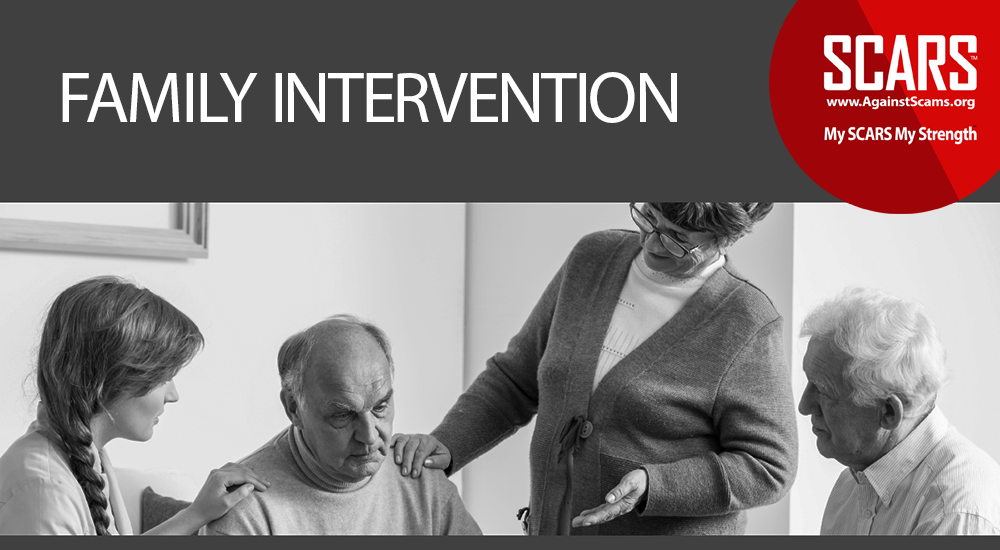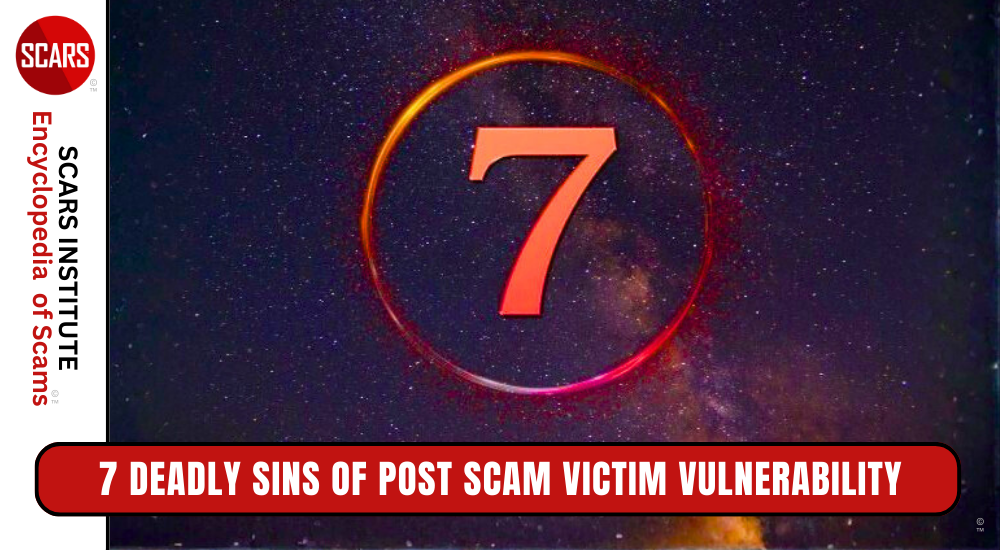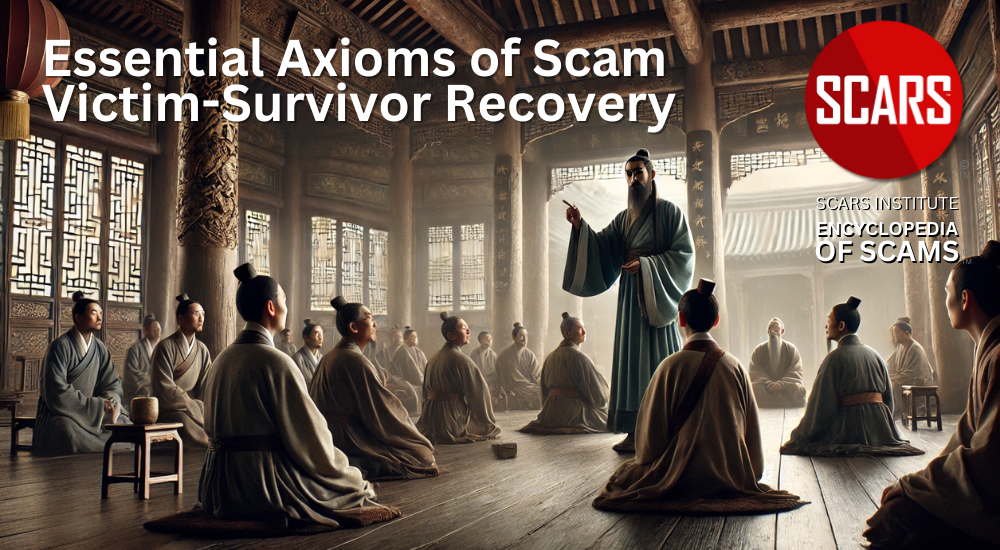
SCARS Institute’s Encyclopedia of Scams™ Published Continuously for 25 Years

Intervention for Relatives of Scam Victims in Total Denial
For Families and Friends of Scam Victims
A SCARS Guide
A SCARS Guide: Intervention For Relatives Of Scam Victims In Total Denial
Why Do Some People Refuse To Get It?
INTRODUCTION
This guide is intended for family members of scam victims that are in denial and refuse to accept that they are being scammed. This is NOT for scam victims themselves.
First, Let’s Explore The Basics Of A Romance Scam
A romance scam is a form of socially engineered fraud that relies on convincing someone that the person on the other side of the screen is in love with the victim. It uses manipulation and the victim’s own projection to cause them to fall in love with the scammer. Because the victim never really sees the scammer face to face, none of the defense mechanisms that humans have evolved are working. This is a mental projection of the victim’s own wants and desires. The bonding is so profound, that the victim’s sense of self will not allow them to recognize the truth that is obvious to everyone else.
The Situation
You have a family member who is in a romance scam online and they refuse to believe that it is or even could be a scam.
Unfortunately, because of the deep connection that has evolved in the mind of the victim, they may be incapable of accepting the truth.
In many cases, this will cause the loss of relationships with family and friends. The fantasy relationship fills such a fundamental need that nothing else matters in their life.
This is not going to be an easy process. In many ways, it is similar to substance abuse and addiction because in the opinions of many a romance scam is an addiction. That during the scam, the brain chemistry is actively releasing dopamine, serotonin, and endorphins – some of the most powerful drugs on earth, and made in our own bodies. To recognize this addiction aspect and much of it will fall into place with addict intervention and rehabilitation.
Another aspect of this is that it is similar to the denial stage of grief, following the loss of a family member. In other words, the refusal to believe is similar to a parent that refuses to accept the death of a child.
If you are unable to get the victim to accept the truth at the end of this, you are strongly recommended to contact a mental health professional for treatment appropriate to the severity of the situation.
What Can Be Done?
The first step is to hold a family intervention where several family members sit down with the victim to discuss the scam. Do not be afraid to be open and honest about the effects it is having on the victim and the family. However, do not use guilt as a lever as this will probably be counter-productive.
There are many useful guides on how to hold an Intervention for Drug Addicts – which is essentially equivalent to Scam Addicts. Here is one such guide: https://www.addictioncenter.com/treatment/stage-intervention/
We recommend the following steps in your intervention cycle
Remember, this is both a behavioral and psychological event in the life of your family member, and we recommend the availability of a mental health professional be included if possible.
STEP 1: The Family Meeting
Gather together your family. Exclude any minors unless they are critical witnesses to the scam and the victim’s behavior. It would be recommended to have an authority figure, such as a parent or older sibling if possible. In the case of elderly victims, this may not be possible but most people have someone they listen to and respect in their family, and this person can be important in helping the victim accept the truth.
It is important to be non-threatening and address this in as dispassionately a manner as possible. Do not let the victim shut down and tune out because of anger focused on them.
Be analytical and factual. Offer your proof, and back it up. Do not simply say it is a scam, show the victim it is.
Show them they are not alone in this, that millions of people have been scammed. Share the stories of other victims. Find them here: https://www.facebook.com/SCARS.Victims.Stories
After you have done all of these things, make it clear that the belief in the scam is causing them harm. Spell it out:
- Missing out on their own family
- Lost money
- Obsessive behavior driving people away
- Their own health and wellbeing
Remember to be blunt but not angry. Tell the truth – hard truth, but limit opinions and any attempts to manipulate them which may cause them to withdraw. Remember that scammers warn victims that their families will not understand and may attempt to break them apart.
However, in the end, if you are still not having success, simply leave what you have said without threats of consequences and move to the next STEP.
STEP 2: Bring In An Authority
If you live in Western Countries, such as the U.S., Canada, UK, Europe, Australia, etc. you have highly professional police forces. Regardless of how large your city or town is, the local police will know about online scams. You can also involve local Social Services – especially if your friend or family member is elderly.
Contact your local police and ask for an officer to visit your family member for a welfare check – explain what the situation is first since in some places they have social workers that can visit with them also.
When the police (or social worker) visits the victim let them do all the talking and only speak up when asked a question or you need to correct a lie told by the victim. It is very important that this is not the family speaking to the victim at this stage, it must be the professional using their authority to explain to the victim what the truth is. This will also allow you to have an independent evaluation of the victim if needed later on in the process. In some cases, the police officer or social worker will provide you with a recommendation for treatment or other support. They may also be able to recommend local resources to help with the situation if the victim still refuses to believe.
STEP 3: Observation
After performing the family intervention and after the authority visit, observe the victim’s behavior.
You want to see if you reached the victim and if they now understand the message. Remember that this is a person they love and if they accept that it was a scam, it is the equivalent of someone dying. They are going to go through the normal stages of grief with all the pain that that brings. Look for those signs and make sure that the victim is supported throughout it.
On the other hand, victims in this state of total denial may lie to you about their acceptance and simply go underground with their communications with the scammer. Be ready for this so that you know what is truly happening.
Understand that all victims lie – to themselves, and to others. When they send money to a scammer they lie to the money transfer service that asks them if they know the person in real life. Be on guard for it here too.
Based on what you see you may need to proceed to the next STEP.
STEP 4: Breaking The Connection
At this stage, you will have come to a determination that the victim is not going to stop. You are going to have to make a very hard set of decisions. Almost all of them will dramatically affect your personal relationship with the victim. This is similar to the decisions that parents have to make with teens, or children make with mentally disabled parents.
Here you have options that you can employ but some of them require the legal authority to do them. We suggest trying to get a power of attorney (unless you already have one).
First: Cut the cord!
Disconnect the person from the internet completely. We don’t mean to turn off Netflix but cut them off from social media, email, Skype, and any means that the scammer can use to contact them. Scammers work with large numbers of victims so they will not waste a lot of time when a victim stops communicating. However, also understand that scammers share lists, so the victim will always be on one of these lists, and scam contacts will pop up in the future if there is a way.
If the person has a smartphone replace it with a flip phone with NO internet data connection.
Watch for attempts to use the internet at libraries and other places that may have computers.
Second: Cut Off The Money
Contact Western Union, Money Gram, and the victim’s bank to notify them the victim is being scammed. Hopefully, they will block further attempts to send money.
However, scammers can also use gift cards as a way of getting money, and these can be sent by mail. Be watchful for these as well.
Third: Legal Control Of Finances
If these fail or you prefer to just jump ahead to this point earlier there is a legal remedy by using your local Family Court.
We recommend that you contact a Family Law attorney to help you understand and navigate this process.
The basic idea is to become the guardian of the victim and as a result, have legal control over the finances of the victim. Even if the victim has been able to maintain contact with the scammer, if the victim has no access to money the scammer will go away on their own – they have other victims to work.
This process may also be necessary if the victim has the need for mental health services and is a danger to themselves.
SCARS Three Steps
We recommend that you also have them read our THREE STEP GUIDE for New Victims to help them with their first steps and a direction to start.
Summary
This is very similar to helping a drug addict or alcoholic recognize their addiction. It will be difficult, and maybe heartbreaking in the process for you and the other family members involved. When the victim finally accepts that it was all a scam it is going to have a profound impact on them and many victims take their own lives.
There is very little that we can do in such a guide to fully prepare you for what you will encounter in this process. You may lose the relationship that you have with the victim – though our experience has shown that these repair eventually after the truth is fully realized.
In most countries, there are substance abuse hotlines that you can turn to for more advice, and you should take advantage of any social services intervention or counseling services if available.
We wish you the very best of luck, and just remember that you are not alone – this affects thousands of victims every day.
We hope this guide helps in understanding your options and the process. Remember that a deep-seated denial may also be an indication of mental illness and you should consult a mental health professional.
Please share your thoughts and experiences with this? Let us know if this guide helped and any additional suggestions that you may have?
NOTE: This is intended for educational purposes only
- We are not offering a medical diagnosis or offering health care or legal advice in this article. Such individuals may, in fact, be suffering from mental illness and should be seen by a competent medical or psychological professional. For legal advice, you should contact a licensed attorney in your locality.
- Additionally, in our experience, such victims are at higher risk of suicide, and appropriate crisis care should be provided if needed. That includes contacting your local or national mental health or suicide crisis hotlines.
-/ 30 /-
What do you think about this?
Please share your thoughts in a comment below!
Table of Contents
LEAVE A COMMENT?
Thank you for your comment. You may receive an email to follow up. We never share your data with marketers.
Recent Comments
On Other Articles
- on Love Bombing And How Romance Scam Victims Are Forced To Feel: “I was love bombed to the point that I would do just about anything for the scammer(s). I was told…” Feb 11, 14:24
- on Dani Daniels (Kira Lee Orsag): Another Scammer’s Favorite: “You provide a valuable service! I wish more people knew about it!” Feb 10, 15:05
- on Danielle Delaunay/Danielle Genevieve – Stolen Identity/Stolen Photos – Impersonation Victim UPDATED 2024: “We highly recommend that you simply turn away form the scam and scammers, and focus on the development of a…” Feb 4, 19:47
- on The Art Of Deception: The Fundamental Principals Of Successful Deceptions – 2024: “I experienced many of the deceptive tactics that romance scammers use. I was told various stories of hardship and why…” Feb 4, 15:27
- on Danielle Delaunay/Danielle Genevieve – Stolen Identity/Stolen Photos – Impersonation Victim UPDATED 2024: “Yes, I’m in that exact situation also. “Danielle” has seriously scammed me for 3 years now. “She” (he) doesn’t know…” Feb 4, 14:58
- on An Essay on Justice and Money Recovery – 2026: “you are so right I accidentally clicked on online justice I signed an agreement for 12k upfront but cd only…” Feb 3, 08:16
- on The SCARS Institute Top 50 Celebrity Impersonation Scams – 2025: “Quora has had visits from scammers pretending to be Keanu Reeves and Paul McCartney in 2025 and 2026.” Jan 27, 17:45
- on Scam Victims Should Limit Their Exposure To Scam News & Scammer Photos: “I used to look at scammers photos all the time; however, I don’t feel the need to do it anymore.…” Jan 26, 23:19
- on After A Scam, No One Can Tell You How You Will React: “This article was very informative, my scams happened 5 years ago; however, l do remember several of those emotions and/or…” Jan 23, 17:17
- on Situational Awareness and How Trauma Makes Scam Victims Less Safe – 2024: “I need to be more observant and I am practicing situational awareness. I’m saving this article to remind me of…” Jan 21, 22:55
ARTICLE META
Important Information for New Scam Victims
- Please visit www.ScamVictimsSupport.org – a SCARS Website for New Scam Victims & Sextortion Victims
- Enroll in FREE SCARS Scam Survivor’s School now at www.SCARSeducation.org
- Please visit www.ScamPsychology.org – to more fully understand the psychological concepts involved in scams and scam victim recovery
If you are looking for local trauma counselors please visit counseling.AgainstScams.org or join SCARS for our counseling/therapy benefit: membership.AgainstScams.org
If you need to speak with someone now, you can dial 988 or find phone numbers for crisis hotlines all around the world here: www.opencounseling.com/suicide-hotlines
A Note About Labeling!
We often use the term ‘scam victim’ in our articles, but this is a convenience to help those searching for information in search engines like Google. It is just a convenience and has no deeper meaning. If you have come through such an experience, YOU are a Survivor! It was not your fault. You are not alone! Axios!
A Question of Trust
At the SCARS Institute, we invite you to do your own research on the topics we speak about and publish, Our team investigates the subject being discussed, especially when it comes to understanding the scam victims-survivors experience. You can do Google searches but in many cases, you will have to wade through scientific papers and studies. However, remember that biases and perspectives matter and influence the outcome. Regardless, we encourage you to explore these topics as thoroughly as you can for your own awareness.
Statement About Victim Blaming
SCARS Institute articles examine different aspects of the scam victim experience, as well as those who may have been secondary victims. This work focuses on understanding victimization through the science of victimology, including common psychological and behavioral responses. The purpose is to help victims and survivors understand why these crimes occurred, reduce shame and self-blame, strengthen recovery programs and victim opportunities, and lower the risk of future victimization.
At times, these discussions may sound uncomfortable, overwhelming, or may be mistaken for blame. They are not. Scam victims are never blamed. Our goal is to explain the mechanisms of deception and the human responses that scammers exploit, and the processes that occur after the scam ends, so victims can better understand what happened to them and why it felt convincing at the time, and what the path looks like going forward.
Articles that address the psychology, neurology, physiology, and other characteristics of scams and the victim experience recognize that all people share cognitive and emotional traits that can be manipulated under the right conditions. These characteristics are not flaws. They are normal human functions that criminals deliberately exploit. Victims typically have little awareness of these mechanisms while a scam is unfolding and a very limited ability to control them. Awareness often comes only after the harm has occurred.
By explaining these processes, these articles help victims make sense of their experiences, understand common post-scam reactions, and identify ways to protect themselves moving forward. This knowledge supports recovery by replacing confusion and self-blame with clarity, context, and self-compassion.
Additional educational material on these topics is available at ScamPsychology.org – ScamsNOW.com and other SCARS Institute websites.
Psychology Disclaimer:
All articles about psychology and the human brain on this website are for information & education only
The information provided in this article is intended for educational and self-help purposes only and should not be construed as a substitute for professional therapy or counseling.
While any self-help techniques outlined herein may be beneficial for scam victims seeking to recover from their experience and move towards recovery, it is important to consult with a qualified mental health professional before initiating any course of action. Each individual’s experience and needs are unique, and what works for one person may not be suitable for another.
Additionally, any approach may not be appropriate for individuals with certain pre-existing mental health conditions or trauma histories. It is advisable to seek guidance from a licensed therapist or counselor who can provide personalized support, guidance, and treatment tailored to your specific needs.
If you are experiencing significant distress or emotional difficulties related to a scam or other traumatic event, please consult your doctor or mental health provider for appropriate care and support.
Also read our SCARS Institute Statement about Professional Care for Scam Victims – click here to go to our ScamsNOW.com website.









![Financial Recovery - Avoid Money Triggers - Perspective on Money for Scam Victims - 2023 [UPDATED 2025] Financial Recovery Money Triggers Financial Recovery - Avoid Money Triggers - Perspective on Money for Scam Victims - 2023 [UPDAYED 2025] - on the SCARS Institute RomanceScamsNOW.com - the Encyclopedia of Scams™](https://romancescamsnow.com/wp-content/uploads/2025/06/Financial-Recovery-Money-Triggers.png)
![Why People Blame Scam Victims? Stop Scam Victim Blaming - [UPDATED 2025] Why People Blame Scam Victims 2025 Why People Blame Scam Victims? Stop Scam Victim Blaming - [UPDATED 2025] - on the SCARS Institute RomanceScamsNOW.com - the Encyclopedia of Scams™](https://romancescamsnow.com/wp-content/uploads/2021/11/Why-People-Blame-Scam-Victims-2025.png)





PLEASE REMEMBER TO REPORT SCAMMER IN OUR SYSTEM NOT ON COMMENTS!
YOU CAN REPORT THEM HERE: https://www.romancescamsnow.com/how-to-report-scammers-fraudsters/
OR ON http://WWW.ANYSCAM.COM AND THEY GO INTO OUR WORLDWIDE NETWORK!